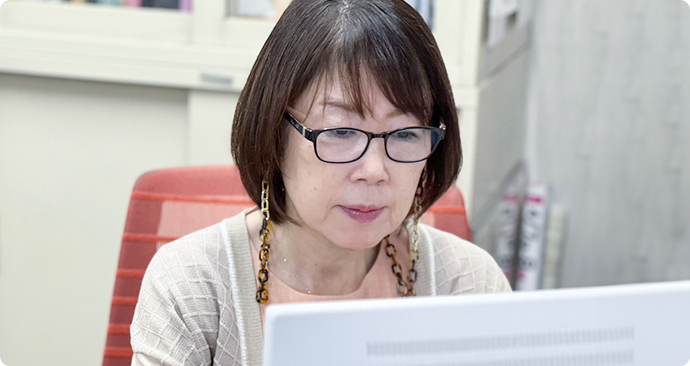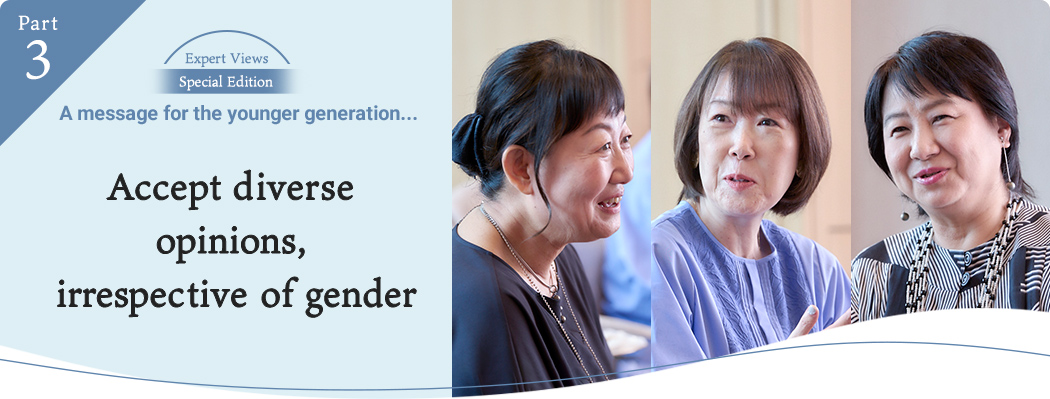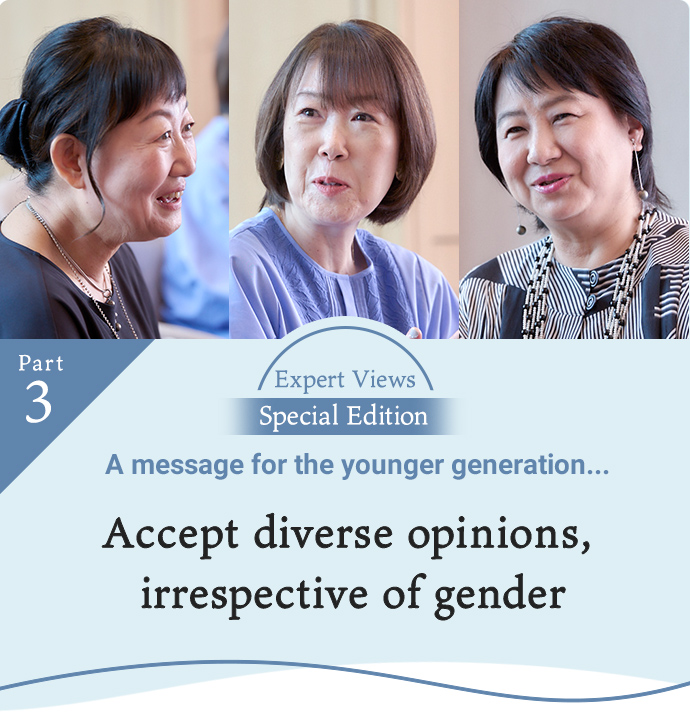
Expert Views

A message for the younger generation…
First Published in Japanese in November 2023 [4 parts]
Factory automation supports the foundations of manufacturing and a connected world. Now that the gender gap in the industry is closing compared to the past, what should female business professional strive for? And what attitudes should male colleagues nurture? Our panelists give advice from an unbiased perspective.
- Nakamura:
- In Japan, it seems more women are working in manufacturing companies these days. What are your impressions?
- Ohta:
- I also feel there are more female engineers. When we have a meeting with five or six engineers, often one of them is female now.
- Takeuchi:
- There are also more young women in sales roles, too. But when it comes to management positions, I get the impression it’s still mostly men. But if you go to China, Europe, or the US, about 1 in 4 managers are female, even in manufacturing companies. I think Japan is still lagging behind those countries.
- Nakamura:
- Why haven’t more women been able to reach management positions in Japan, like in other countries?
- Takeuchi:
- For many years, Japan’s working culture was time-oriented rather than results-oriented, so people who could work 24 hours a day would get promoted. Life events, such as getting married and having children, have tended to place a burden on women, giving them less flexibility with their time management. This is starting to change as the focus turns to efficiency rather than time spent working. This is making it easier for women to progress in their career and find a work-life balance.
- Nakamura:
- The three of you have overcome difficult times for women, and as a result you are now able to become role models for our younger colleagues. Who were your role models back in the days when there were far fewer women working in the manufacturing industry?

Maki Mizowaki, who takes pride in the homely atmosphere of her office, working on her PC
- Mizowaki:
- For me, it was my mother. My father suddenly passed away at the age of 54, so my mother found herself having to take over as the company’s second president. Until then she had only been helping my father out, so there must have been a lot that was unfamiliar to her, but I watched her take on this great responsibility and do her best for the sake of the company and employees. That’s why she is the ultimate role model to me.
- Nakamura:
- Your mother stepped up to the challenge without shirking from that great responsibility. She certainly provided a role model worthy of respect, especially as you must have experienced the same when you became company president. So, turning to President Ohta, did you have any female role models?
- Ohta:
- When I was at Mitsubishi Electric, I had some senior female colleagues in the Corporate Advertising Division. At the start of my career, I learned a lot from the way they treated the people around them with consideration. Even as times change, care and consideration for others will always be important, regardless of gender.
- Nakamura:
- Ms. Takeuchi, I believe you were the first woman in our company to work in a managerial position while raising a family. Was it difficult for you to navigate that unprecedented situation without a role model?
- Takeuchi:
- When my children were young, every day was so hectic – getting everyone up in the morning, going to work, finishing work, collecting everyone, and coming home – to be honest, I didn’t have time to worry about anything. It was just a case of getting through the day, one at a time.
- Nakamura:
- For a woman to successfully balance a family and a career, it’s vital to feel understood and supported by your family and colleagues, isn’t it. I “educated” my partner during parental leave, too!
- Ohta:
- As Ms. Takeuchi said, I think the reality is that it was frowned upon to take a day off work for a school event or if your child suddenly fell sick. But it’s about supporting one another, finding ways to work or ways to make the best use of your time. I think companies need to create an environment where employees can help each other.
- Mizowaki:
- At my company, we have a lot of young male employees in their 30s and 40s, and thankfully they are very cooperative when it comes to flexible working arrangements for women. In turn, the female employees are grateful for this support and more cooperative towards the male employees. This naturally creates a pleasant working environment for everyone. Perhaps this is one of the good things about small and medium-sized companies like ours.
- Takeuchi:
- As President Mizowaki mentioned, it is wonderful for people to come up with their own ways to enjoy working. I want everyone in my workplace to be receptive to diverse opinions, rather than just accepting the perceived way things have been done. We are working to create an environment where everyone’s opinions are accepted and can be discussed, irrespective of gender.
- Ohta:
- Men and women can have different perspectives and ways of looking at things. For example, if you encourage women to join meetings and speak proactively, you are sure to find opinions and points of view that men do not have. I think women should not hesitate to speak up, and that men should listen to what we have to say as an equal.
- Takeuchi:
- As you say, if a meeting involves only men, opinions often tend to be one-sided. It only takes one woman to join in that meeting and ask “Why?” to start a new line of communication. And then if you add somebody from another country, they might provide a completely new perspective. An environment where everyone can flourish, regardless of gender, age, or nationality, is sure to bring immeasurable benefits.
- Nakamura:
- To succeed in business, women need to speak up and be proactive, and being seen and understood by male colleagues is vital. We have reached a crucial point in our discussion – thank you, everyone!

